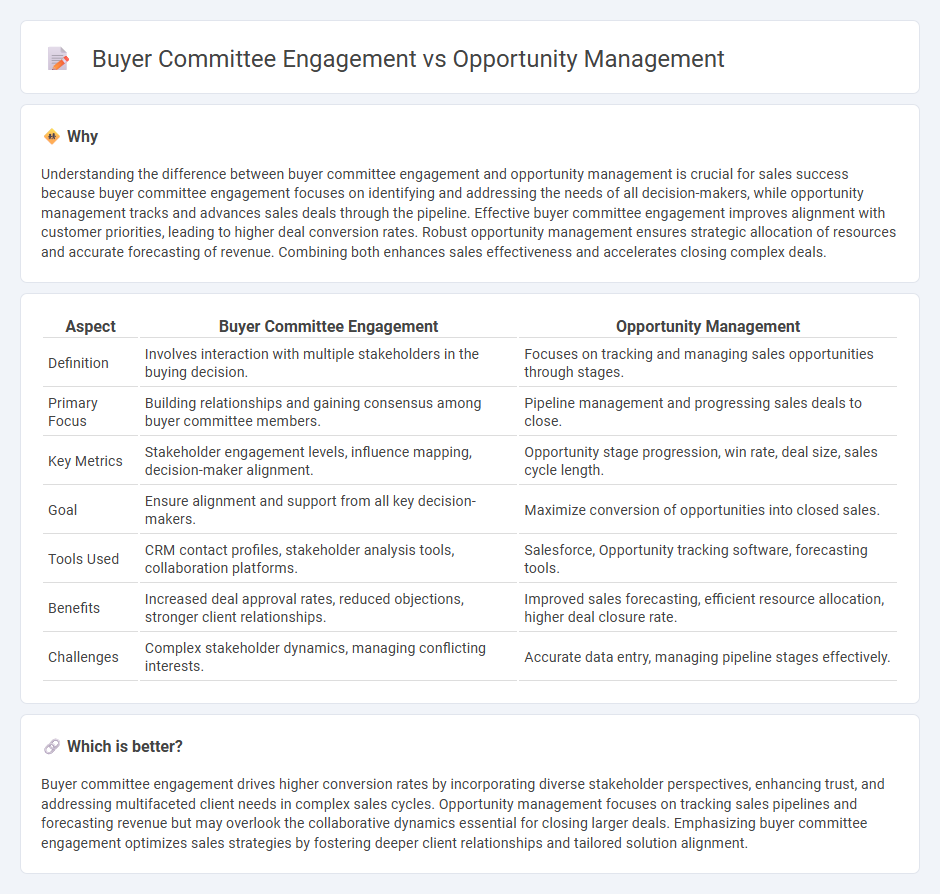
Buyer committee engagement focuses on aligning multiple stakeholders' priorities to drive consensus and accelerate the sales cycle, while opportunity management emphasizes tracking and forecasting individual deals within the pipeline. Effective buyer committee engagement enhances collaboration and addresses diverse buyer needs, improving win rates compared to managing opportunities in isolation. Explore how integrating both strategies can optimize sales performance and close deals faster.
Why it is important
Understanding the difference between buyer committee engagement and opportunity management is crucial for sales success because buyer committee engagement focuses on identifying and addressing the needs of all decision-makers, while opportunity management tracks and advances sales deals through the pipeline. Effective buyer committee engagement improves alignment with customer priorities, leading to higher deal conversion rates. Robust opportunity management ensures strategic allocation of resources and accurate forecasting of revenue. Combining both enhances sales effectiveness and accelerates closing complex deals.
Comparison Table
| Aspect | Buyer Committee Engagement | Opportunity Management |
|---|---|---|
| Definition | Involves interaction with multiple stakeholders in the buying decision. | Focuses on tracking and managing sales opportunities through stages. |
| Primary Focus | Building relationships and gaining consensus among buyer committee members. | Pipeline management and progressing sales deals to close. |
| Key Metrics | Stakeholder engagement levels, influence mapping, decision-maker alignment. | Opportunity stage progression, win rate, deal size, sales cycle length. |
| Goal | Ensure alignment and support from all key decision-makers. | Maximize conversion of opportunities into closed sales. |
| Tools Used | CRM contact profiles, stakeholder analysis tools, collaboration platforms. | Salesforce, Opportunity tracking software, forecasting tools. |
| Benefits | Increased deal approval rates, reduced objections, stronger client relationships. | Improved sales forecasting, efficient resource allocation, higher deal closure rate. |
| Challenges | Complex stakeholder dynamics, managing conflicting interests. | Accurate data entry, managing pipeline stages effectively. |
Which is better?
Buyer committee engagement drives higher conversion rates by incorporating diverse stakeholder perspectives, enhancing trust, and addressing multifaceted client needs in complex sales cycles. Opportunity management focuses on tracking sales pipelines and forecasting revenue but may overlook the collaborative dynamics essential for closing larger deals. Emphasizing buyer committee engagement optimizes sales strategies by fostering deeper client relationships and tailored solution alignment.
Connection
Buyer committee engagement directly influences opportunity management by providing comprehensive insights into stakeholders' needs, preferences, and decision-making criteria. Effective collaboration with the buyer committee helps sales teams tailor proposals and prioritize opportunities with higher conversion potential. This targeted engagement improves forecasting accuracy and accelerates deal closure rates, driving overall sales performance.
Key Terms
Opportunity management:
Opportunity management entails tracking and optimizing sales chances through structured stages like qualification, proposal, and closing, leveraging CRM tools to enhance forecasting accuracy and deal prioritization. Effectively managing opportunities improves resource allocation, shortens sales cycles, and boosts conversion rates by aligning team efforts with customer needs. Explore advanced strategies and tools to master opportunity management and drive revenue growth.
Pipeline
Opportunity management streamlines the sales pipeline by identifying, tracking, and prioritizing potential deals based on their likelihood to close, ensuring resources are allocated efficiently for maximum revenue impact. Buyer committee engagement involves actively collaborating with multiple stakeholders within the buying organization to address concerns, build consensus, and accelerate decision-making, which enhances pipeline velocity and deal quality. Explore how integrating these strategies can optimize your pipeline performance and drive consistent sales growth.
Qualification
Opportunity management emphasizes systematically assessing deal viability through criteria such as budget, authority, need, and timeline (BANT) to prioritize high-potential sales prospects. Buyer committee engagement centers on understanding and influencing the diverse stakeholders involved in decision-making to align solutions with their specific pain points and buying motivations. Explore how integrating both approaches optimizes qualification processes and accelerates sales success in complex B2B environments.
Source and External Links
Opportunity Management | www.dau.edu - Opportunity management is a proactive process focused on identifying, analyzing, managing, and monitoring potential future benefits to a program's cost, schedule, or performance, using a five-step process including planning, identification, analysis, management decision, and monitoring to improve program outcomes and offset risks.
What is Opportunity Management (OM)? - DealHub - Opportunity management in sales is a structured process to track and optimize potential sales deals through their lifecycle by understanding the sales pipeline, assigning responsibilities, and leveraging data-driven insights to close more deals efficiently.
What is Opportunity Management? - MindMatrix - Opportunity management is a systematic approach to identify, qualify, assess, prioritize, track, and analyze business opportunities throughout their lifecycle to maximize returns and ensure alignment with company goals and resources.
 dowidth.com
dowidth.com